北师大版(2019)选修一Unit 1 Relationships Lesson 2 How Do We Like Teachers' Feed back_ 课件(共22张PPT)
文档属性
| 名称 | 北师大版(2019)选修一Unit 1 Relationships Lesson 2 How Do We Like Teachers' Feed back_ 课件(共22张PPT) |

|
|
| 格式 | pptx | ||
| 文件大小 | 5.8MB | ||
| 资源类型 | 教案 | ||
| 版本资源 | 北师大版(2019) | ||
| 科目 | 英语 | ||
| 更新时间 | 2024-04-08 00:00:00 | ||
图片预览

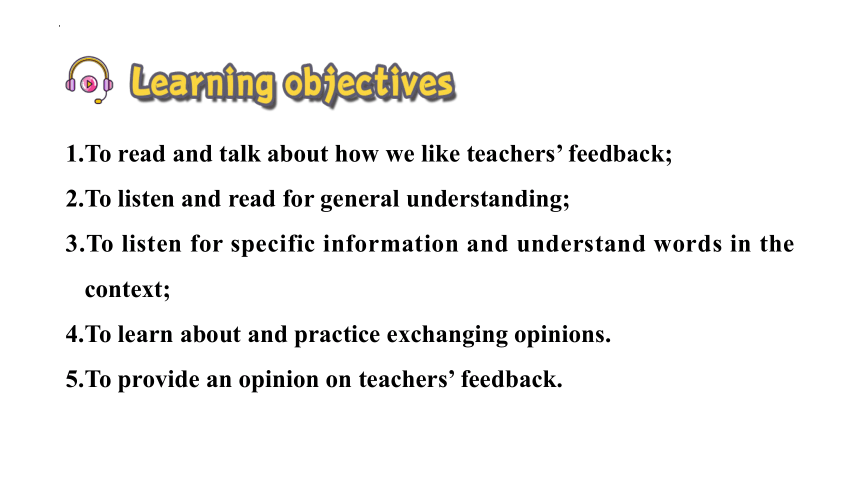
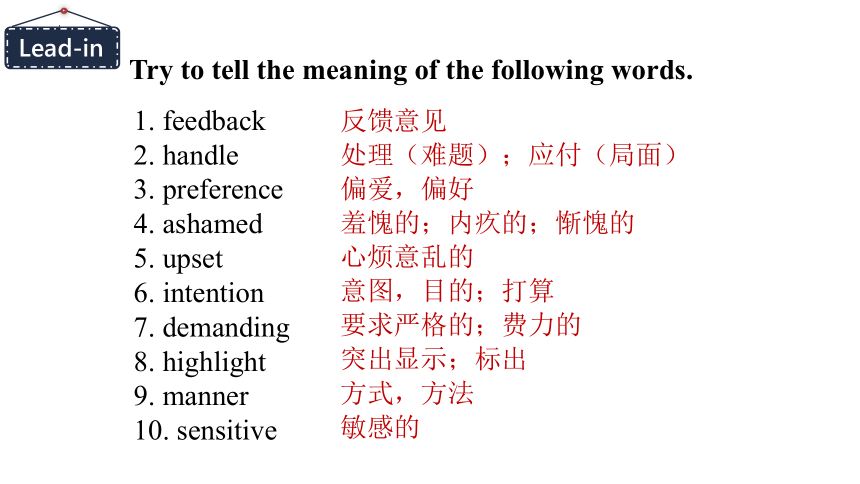
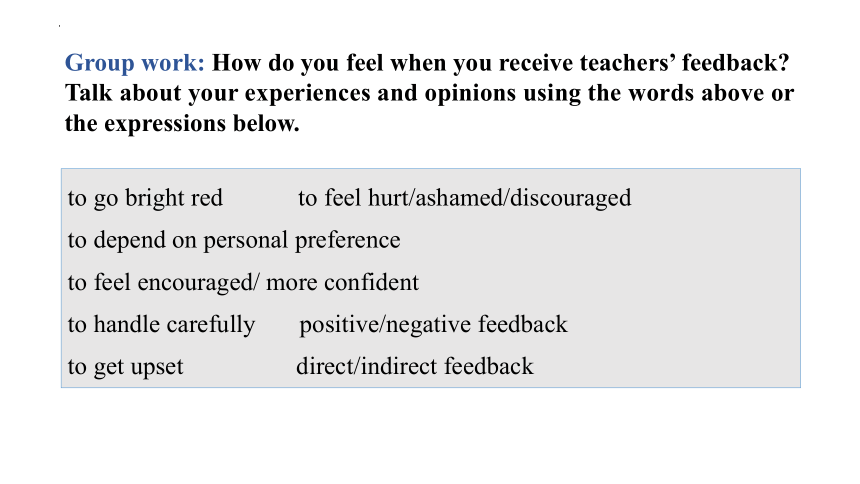
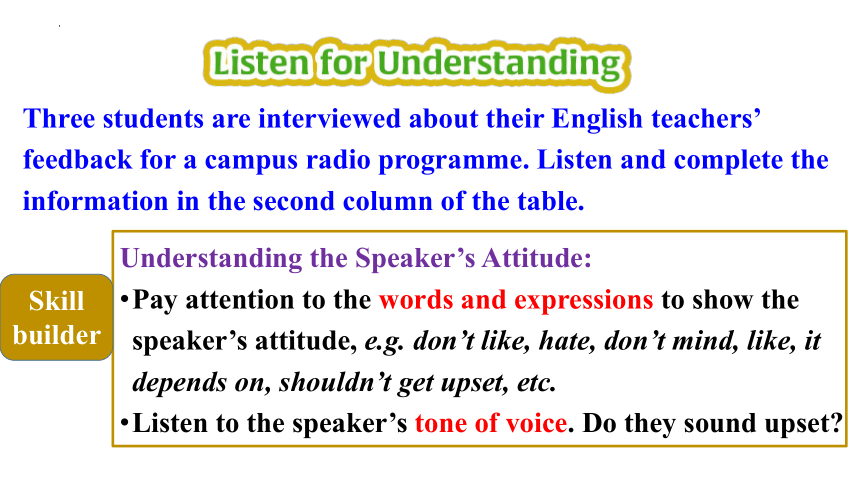
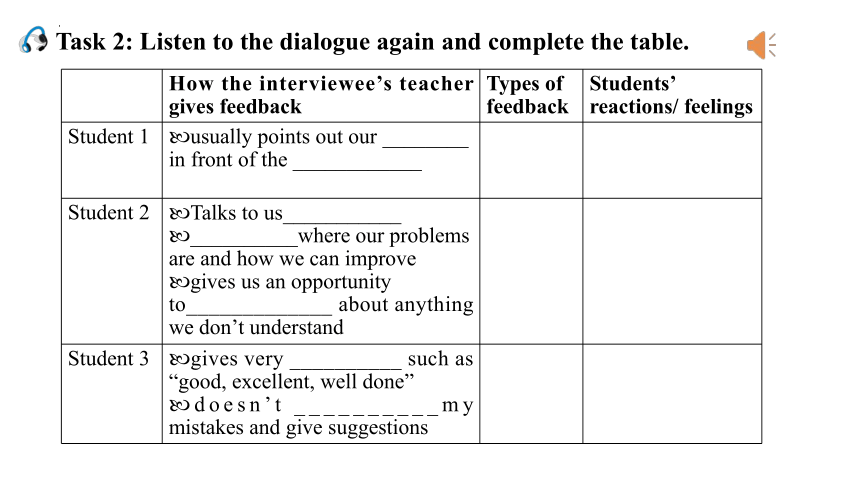
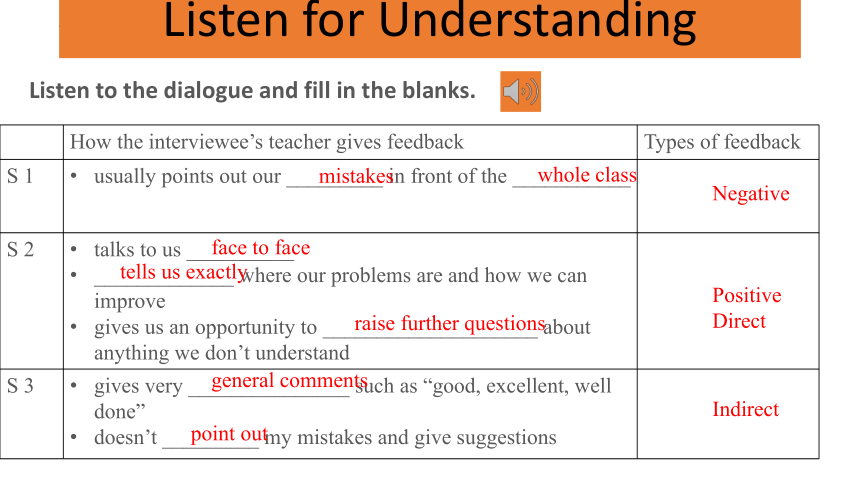
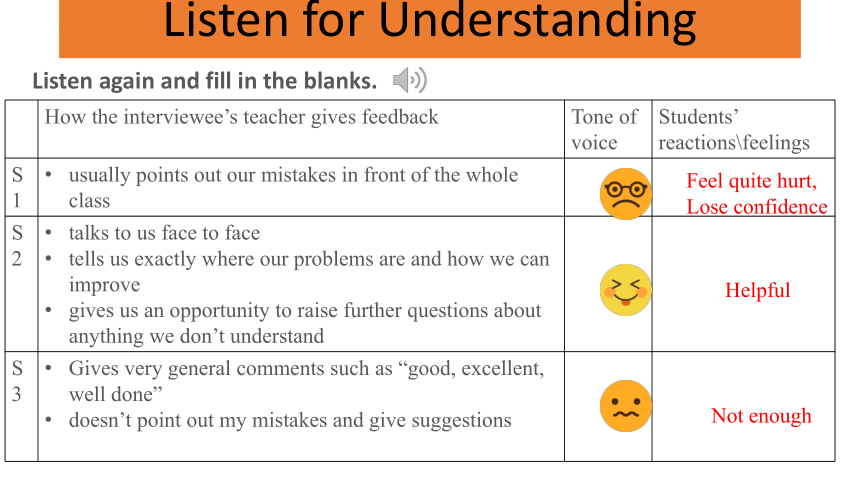

文档简介
(共22张PPT)
新北师大版高中英语选择性必修一Unit1 Relationships
Lesson2 How do we like teachers’ feedback
1.To read and talk about how we like teachers’ feedback;
2.To listen and read for general understanding;
3.To listen for specific information and understand words in the context;
4.To learn about and practice exchanging opinions.
5.To provide an opinion on teachers’ feedback.
Lead-in
1. feedback
2. handle
3. preference
4. ashamed
5. upset
6. intention
7. demanding
8. highlight
9. manner
10. sensitive
反馈意见
处理(难题);应付(局面)
偏爱,偏好
羞愧的;内疚的;惭愧的
心烦意乱的
意图,目的;打算
要求严格的;费力的
突出显示;标出
方式,方法
敏感的
Try to tell the meaning of the following words.
Group work: How do you feel when you receive teachers’ feedback Talk about your experiences and opinions using the words above or the expressions below.
to go bright red to feel hurt/ashamed/discouraged
to depend on personal preference
to feel encouraged/ more confident
to handle carefully positive/negative feedback
to get upset direct/indirect feedback
Three students are interviewed about their English teachers’ feedback for a campus radio programme. Listen and complete the information in the second column of the table.
Understanding the Speaker’s Attitude:
Pay attention to the words and expressions to show the speaker’s attitude, e.g. don’t like, hate, don’t mind, like, it depends on, shouldn’t get upset, etc.
Listen to the speaker’s tone of voice. Do they sound upset
Skill builder
Task 2: Listen to the dialogue again and complete the table.
How the interviewee’s teacher gives feedback Types of feedback Students’ reactions/ feelings
Student 1 usually points out our ________ in front of the ____________
Student 2 Talks to us___________ __________where our problems are and how we can improve gives us an opportunity to_____________ about anything we don’t understand
Student 3 gives very __________ such as “good, excellent, well done” doesn’t __________my mistakes and give suggestions
Listen for Understanding
How the interviewee’s teacher gives feedback Types of feedback
S 1 usually points out our _________ in front of the ___________
S 2 talks to us __________ _____________ where our problems are and how we can improve gives us an opportunity to ____________________ about anything we don’t understand
S 3 gives very _______________ such as “good, excellent, well done” doesn’t _________ my mistakes and give suggestions
mistakes
whole class
face to face
tells us exactly
raise further questions
general comments
point out
Negative
Positive
Direct
Indirect
Listen to the dialogue and fill in the blanks.
Listen for Understanding
How the interviewee’s teacher gives feedback Tone of voice Students’ reactions\feelings
S1 usually points out our mistakes in front of the whole class
S2 talks to us face to face tells us exactly where our problems are and how we can improve gives us an opportunity to raise further questions about anything we don’t understand
S3 Gives very general comments such as “good, excellent, well done” doesn’t point out my mistakes and give suggestions
Feel quite hurt,
Lose confidence
Helpful
Not enough
Listen again and fill in the blanks.
1. Act out the interview in groups of four. Use the notes in Activity 2 to help you.
2. How many types of feedback have you noted down Sort them into different categories, e.g. positive and negative. Think of more types of feedback if you can.
Positive and negative feedback
General and specific feedback
Direct and indirect feedback
Task 6: Listen to the dialogue again and complete the summary with the words from the listening.
Matt Dickson interviewed three students about their feelings of English teachers’ 1._______.The first student thinks his teacher’s feedback is negative and makes him lose 2.__________. But he understands her 3._______. The second student thinks the feedback from her teacher is more 4.________ even though it is more 5._________ for her teacher. She can raise 6.______ questions about anything she doesn’t understand. The third student thinks his teacher often gives very general 7._________. But he wants to know where his 8._________ and weaknesses are. He thinks feedback should be 9._______. For example, the teacher can 10.________ his mistakes and say things like “You need to work on the past tenses some more”.
feedback
confidence
intention
effective
demanding
further
comments
strengths
specific
highlight
Listen to the conversation between two professors about giving teachers’ feedback to students. Find out their opinions and reasons.
EXCHANGING OPINIONS
Opinions Reasons
Professor Smith
Professor Jones
Try to give feedback in a less direct manner.
It is best to point out students’ problem directly.
1. Understand some students’ feelings about direct feedback.
2. Negative feedback might hurt students’ confidence and interest in learning.
Students need to get used to tough comments when they don’t do good work.
Task 2: Listen again and answer the following questions.
What is the female’s opinion about giving feedback
▲I am always _______about how to give feedback.
▲It is helpful to give_______________ , but very negative feedback might hurt students’ confidence and _______ in learning.
▲We should give negative feedback in a __________ manner, especially to those who are shy or________.
careful
specific feedback
interest
less direct
sensitive
Task 3: Listen again and answer the following questions.
What is the male’s opinion about giving feedback
▲It is best to ________ students’ problems directly, which is more_________ .
▲Students should get used to ______________
▲I want to help students but certainly don’t want to ______them.
point out
tough comments
effective
upset
Task 4: Listen again and plete the Talk Builder.
1._________it is best to point out students’ problems directly.
2.Also, _______they should realize that any feedback isn’t personal.
3.______________you about that, but to be more helpful...
4.______________. Perhaps I should try that.
I can agree with
I believe
I think
I see your point
1.to depend on personal preference
搭配:
①have a preference for 对......有所偏爱,更喜欢......
②show a preference for 对......表现出偏爱
Of the two, my preference is the smallest car.
Any teacher will show a preference for the students who work hard.
n. 偏爱,偏好,优待,优先权
Language Points
归纳拓展
2.prefer .vt.更喜欢(preferred)
①prefer doing sth... 更喜欢做......
②prefer sth to sth 喜欢......胜过......
③prefer doing sth to doing sth更喜欢做......而不愿做......
④prefer to do sth rather than do sth
=would do sth rather than do sth
=would rather do sth than do sth
宁愿做......而不愿做......
5.to feel hurt/ashamed/discouraged感到受伤害/羞愧/气馁
ashamed .adj.羞愧的;内疚的;惭愧的
搭配
①be ashamed of 为......感到羞愧
②be ashamed to do sth因做某事而感到惭愧
③be ashamed that... 为......感到羞愧(加句子)
ashamed用来修饰人
shameful“可耻的”,用来修饰物
The boy is ashamed of his shameful behaviour.
6.But I do understand my teacher’s intention.
搭配
①have no intention of doing sth 无意做某事
②with the intention of 打算......
eg:To tell the truth,I have no intention of telling him the news.
n. 意图,目的,打算
归纳拓展
①intend to do sth
=intend doing sth打算做某事
②intend sb to do sth打算让某人做某事
③be intended for sth专为......而设计的
④be intended to do sth 旨在/意欲做某事
eg:I don’t intend to stay/staying here for long.
The movie intended for the children has attracted a lot of adults.
归纳拓展
demand .n.要求,需求 vt.要求
in demand被需要
meet the demand of... 满足......的要求/需求
demand to do sth要求做某事
注:demand后的名词性从句,谓语要用虚拟语气(即should+动词原形,should可省略),类似的词还有order,command,suggest,advise,recommend等
11.sensitive .adj.敏感的,善解人意的
be sensitive to 对......敏感,对......善解人意
eg:She is easily upset because she is too sensitive to what others say.
make sense 有道理,有意义,讲得通
新北师大版高中英语选择性必修一Unit1 Relationships
Lesson2 How do we like teachers’ feedback
1.To read and talk about how we like teachers’ feedback;
2.To listen and read for general understanding;
3.To listen for specific information and understand words in the context;
4.To learn about and practice exchanging opinions.
5.To provide an opinion on teachers’ feedback.
Lead-in
1. feedback
2. handle
3. preference
4. ashamed
5. upset
6. intention
7. demanding
8. highlight
9. manner
10. sensitive
反馈意见
处理(难题);应付(局面)
偏爱,偏好
羞愧的;内疚的;惭愧的
心烦意乱的
意图,目的;打算
要求严格的;费力的
突出显示;标出
方式,方法
敏感的
Try to tell the meaning of the following words.
Group work: How do you feel when you receive teachers’ feedback Talk about your experiences and opinions using the words above or the expressions below.
to go bright red to feel hurt/ashamed/discouraged
to depend on personal preference
to feel encouraged/ more confident
to handle carefully positive/negative feedback
to get upset direct/indirect feedback
Three students are interviewed about their English teachers’ feedback for a campus radio programme. Listen and complete the information in the second column of the table.
Understanding the Speaker’s Attitude:
Pay attention to the words and expressions to show the speaker’s attitude, e.g. don’t like, hate, don’t mind, like, it depends on, shouldn’t get upset, etc.
Listen to the speaker’s tone of voice. Do they sound upset
Skill builder
Task 2: Listen to the dialogue again and complete the table.
How the interviewee’s teacher gives feedback Types of feedback Students’ reactions/ feelings
Student 1 usually points out our ________ in front of the ____________
Student 2 Talks to us___________ __________where our problems are and how we can improve gives us an opportunity to_____________ about anything we don’t understand
Student 3 gives very __________ such as “good, excellent, well done” doesn’t __________my mistakes and give suggestions
Listen for Understanding
How the interviewee’s teacher gives feedback Types of feedback
S 1 usually points out our _________ in front of the ___________
S 2 talks to us __________ _____________ where our problems are and how we can improve gives us an opportunity to ____________________ about anything we don’t understand
S 3 gives very _______________ such as “good, excellent, well done” doesn’t _________ my mistakes and give suggestions
mistakes
whole class
face to face
tells us exactly
raise further questions
general comments
point out
Negative
Positive
Direct
Indirect
Listen to the dialogue and fill in the blanks.
Listen for Understanding
How the interviewee’s teacher gives feedback Tone of voice Students’ reactions\feelings
S1 usually points out our mistakes in front of the whole class
S2 talks to us face to face tells us exactly where our problems are and how we can improve gives us an opportunity to raise further questions about anything we don’t understand
S3 Gives very general comments such as “good, excellent, well done” doesn’t point out my mistakes and give suggestions
Feel quite hurt,
Lose confidence
Helpful
Not enough
Listen again and fill in the blanks.
1. Act out the interview in groups of four. Use the notes in Activity 2 to help you.
2. How many types of feedback have you noted down Sort them into different categories, e.g. positive and negative. Think of more types of feedback if you can.
Positive and negative feedback
General and specific feedback
Direct and indirect feedback
Task 6: Listen to the dialogue again and complete the summary with the words from the listening.
Matt Dickson interviewed three students about their feelings of English teachers’ 1._______.The first student thinks his teacher’s feedback is negative and makes him lose 2.__________. But he understands her 3._______. The second student thinks the feedback from her teacher is more 4.________ even though it is more 5._________ for her teacher. She can raise 6.______ questions about anything she doesn’t understand. The third student thinks his teacher often gives very general 7._________. But he wants to know where his 8._________ and weaknesses are. He thinks feedback should be 9._______. For example, the teacher can 10.________ his mistakes and say things like “You need to work on the past tenses some more”.
feedback
confidence
intention
effective
demanding
further
comments
strengths
specific
highlight
Listen to the conversation between two professors about giving teachers’ feedback to students. Find out their opinions and reasons.
EXCHANGING OPINIONS
Opinions Reasons
Professor Smith
Professor Jones
Try to give feedback in a less direct manner.
It is best to point out students’ problem directly.
1. Understand some students’ feelings about direct feedback.
2. Negative feedback might hurt students’ confidence and interest in learning.
Students need to get used to tough comments when they don’t do good work.
Task 2: Listen again and answer the following questions.
What is the female’s opinion about giving feedback
▲I am always _______about how to give feedback.
▲It is helpful to give_______________ , but very negative feedback might hurt students’ confidence and _______ in learning.
▲We should give negative feedback in a __________ manner, especially to those who are shy or________.
careful
specific feedback
interest
less direct
sensitive
Task 3: Listen again and answer the following questions.
What is the male’s opinion about giving feedback
▲It is best to ________ students’ problems directly, which is more_________ .
▲Students should get used to ______________
▲I want to help students but certainly don’t want to ______them.
point out
tough comments
effective
upset
Task 4: Listen again and plete the Talk Builder.
1._________it is best to point out students’ problems directly.
2.Also, _______they should realize that any feedback isn’t personal.
3.______________you about that, but to be more helpful...
4.______________. Perhaps I should try that.
I can agree with
I believe
I think
I see your point
1.to depend on personal preference
搭配:
①have a preference for 对......有所偏爱,更喜欢......
②show a preference for 对......表现出偏爱
Of the two, my preference is the smallest car.
Any teacher will show a preference for the students who work hard.
n. 偏爱,偏好,优待,优先权
Language Points
归纳拓展
2.prefer .vt.更喜欢(preferred)
①prefer doing sth... 更喜欢做......
②prefer sth to sth 喜欢......胜过......
③prefer doing sth to doing sth更喜欢做......而不愿做......
④prefer to do sth rather than do sth
=would do sth rather than do sth
=would rather do sth than do sth
宁愿做......而不愿做......
5.to feel hurt/ashamed/discouraged感到受伤害/羞愧/气馁
ashamed .adj.羞愧的;内疚的;惭愧的
搭配
①be ashamed of 为......感到羞愧
②be ashamed to do sth因做某事而感到惭愧
③be ashamed that... 为......感到羞愧(加句子)
ashamed用来修饰人
shameful“可耻的”,用来修饰物
The boy is ashamed of his shameful behaviour.
6.But I do understand my teacher’s intention.
搭配
①have no intention of doing sth 无意做某事
②with the intention of 打算......
eg:To tell the truth,I have no intention of telling him the news.
n. 意图,目的,打算
归纳拓展
①intend to do sth
=intend doing sth打算做某事
②intend sb to do sth打算让某人做某事
③be intended for sth专为......而设计的
④be intended to do sth 旨在/意欲做某事
eg:I don’t intend to stay/staying here for long.
The movie intended for the children has attracted a lot of adults.
归纳拓展
demand .n.要求,需求 vt.要求
in demand被需要
meet the demand of... 满足......的要求/需求
demand to do sth要求做某事
注:demand后的名词性从句,谓语要用虚拟语气(即should+动词原形,should可省略),类似的词还有order,command,suggest,advise,recommend等
11.sensitive .adj.敏感的,善解人意的
be sensitive to 对......敏感,对......善解人意
eg:She is easily upset because she is too sensitive to what others say.
make sense 有道理,有意义,讲得通
同课章节目录
- Unit 1 Relationshis
- Lesson 1 Teachers
- Lesson 2 How Do We Like Teachers’ Feedback?
- Lesson 3 So Close,Yet So Fa
- Unit 2 Success
- Lesson 1 Money vs Success
- Lesson 2 Top Five Secrets of Success
- Lesson 3 Getting to the Top
- Unit 3 Conservation
- Lesson 1 The Sixth Extinction
- Lesson 2 War on Plastic Packets
- Lesson 3 The Road to Destruction
